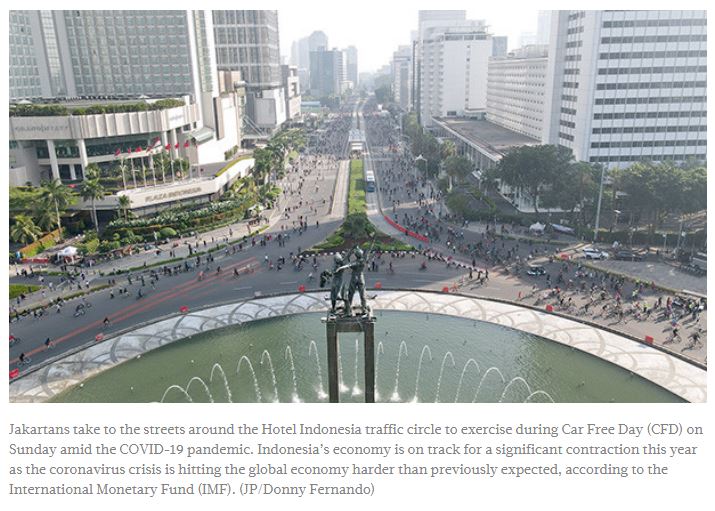‘Crisis like no other’ will shrink Indonesia’s economy, IMF forecasts
Indonesia’s economy is on track for a significant contraction this year as the coronavirus crisis has hit the global economy more severely than previously expected, the International Monetary Fund (IMF) has forecast.
The United States-based institution projects that Southeast Asia’s biggest economy will contract by 0.3 percent this year, according to the June update of the World Economic Outlook titled A Crisis Like No Other, An Uncertain Recovery, which was published on Wednesday. The global economy, meanwhile, is expected to shrink by 4.9 percent.
“The COVID-19 pandemic has had a more negative impact on activity in the first half of 2020 than anticipated, and the recovery is projected to be more gradual than previously forecast,” the IMF said, highlighting a reversal of progress on poverty reduction and job creation.
“In countries with high shares of informal employment, lockdowns have led to joblessness and abrupt income losses for many of those workers,” the report reads. “The adverse impact on low-income households is acute, imperiling the significant progress made in reducing extreme poverty in the world.”
More than 3.06 million Indonesians have either been laid-off or furloughed as of May 27, according to Manpower Ministry data. The government expects that 5.5 million of the country’s workforce, dominated by those working in the informal sector, will lose their jobs this year following slowing economic activity.
The COVID-19 pandemic has disrupted businesses and factories as people are forced to stay at home to contain the coronavirus spread. Indonesia’s economic growth cooled to 2.97 percent in the first quarter as household spending and investment plunged.
Finance Minister Sri Mulyani Indrawati has projected that the economy will contract by more than 3 percent year-on-year in the second quarter. She expects full-year growth of 1 percent under the baseline scenario but a full-year contraction of 0.4 percent under the worst-case scenario.
On Wednesday, the IMF also trimmed Indonesia’s economic growth forecast for next year to 6.1 percent, down from its earlier projection of 8.2 percent, as the path to recovery remains uncertain.
The global economy, meanwhile, would plunged into the deepest recession since the Great Depression of the 1930s, as household spending weakened, while investment subdued, the fund projected.
“The projections of weaker private consumption reflect a combination of a large adverse aggregate demand shock from social distancing and lockdowns, as well as a rise in precautionary savings,” it reads. “Moreover, investment is expected to be subdued as firms defer capital expenditures amid high uncertainty.”
Uncertainty surrounding the global economy, including the trajectory of the virus and vaccine trials, are key factors shaping the outlook, the report goes on to say.
“The downturn could be less severe than forecast if economic normalization proceeds faster than currently expected in areas that have reopened,” it reads, while adding that downside risks, such as future outbreaks, remain significant.
Policymakers, the IMF suggests, should consider strengthening fiscal stimulus measures to respond to deteriorating economic conditions.
“Temporary targeted cash transfers to low-income households that kick in when the unemployment rate or jobless claims rise above a certain threshold—can be highly effective in dampening downturns.”
The Indonesian government has allocated Rp 695.2 trillion (US$ 49.3 billion) worth of COVID-19 spending to boost economic growth and strengthen healthcare systems amid the pandemic.
The IMF’s gloomy projection adds to an already long list of weakening expectations for the Indonesian economy made by other international institutions.
The World Bank has projected 0 percent growth for Indonesia this year as the global economy is expected to see its deepest downturn since World War II.
The Organization for Economic Cooperation and Development (OECD) expect the Indonesian economy to shrink 2.8 percent this year even if the government manages to avoid a second wave of infections. If it is hit by a second wave, however, the economy could witness a 3.9 percent contraction.
The Asian Development Bank (ADB) projected Indonesia’s gross domestic product (GDP) to shrink 1 percent this year, which would be the weakest performance since the 1998 Asian financial crisis.
Meanwhile, international rating agency Moody’s Investor Service expected Indonesia’s economy to shrink by 0.8 percent this year, followed by a strong rebound of 6.1 percent in 2021.
“We continue to expect a gradual recovery beginning in the second half of the year, but that outcome will depend on whether governments can reopen their economies while also safeguarding public health,” Moody’s said in its Global Macro Outlook 2020-21 June Update.
Moody’s expects the G20 economies to contract by 4.6 percent this year, followed by 5.2 percent growth next year.
Source: https://www.thejakartapost.com/news/2020/06/25/crisis-like-no-other-will-shrink-indonesias-economy-imf-forecasts.html


 Thailand
Thailand




